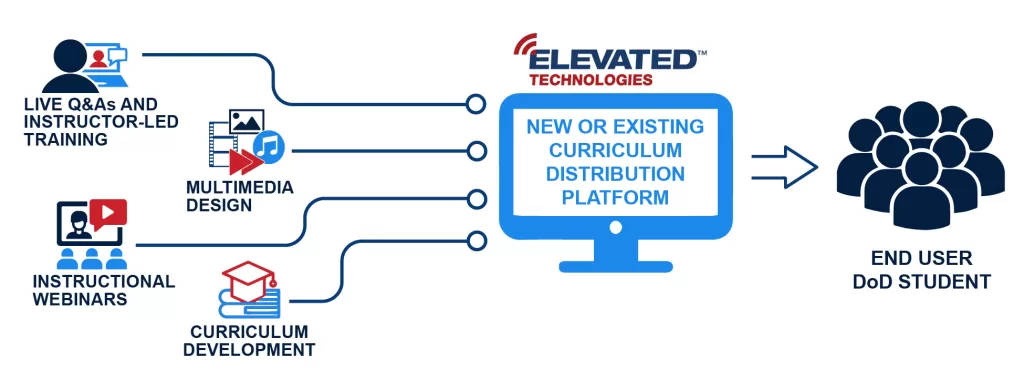
Published: 06/06/2023
Elevated Technologies LLC, a leader in innovative technological solutions, understands the importance of e-Learning for the Department of Defense (DoD). With the extensive responsibilities of the DoD, it is essential to have a training and education system that is efficient, adaptable, and tailor-made for the specific needs of each individual or unit.
The traditional brick and mortar method of training, where one or more instructors conduct classroom lectures, has its advantages, but we understand it also has its limitations for some programs. E-Learning, on the other hand, provides an online learning environment, enabling access to interactive multimedia resources, including videos, webinars, simulations, and assessments. This online method of training is effective, impactful, and has the potential to provide a more immersive and engaging experience for all types of learners.
One of the benefits of e-Learning for the DoD is its capability to offer training and education to a larger audience, regardless of location, time zone, or language. This flexibility comes in handy for anyone who may face geographical restrictions in accessing training programs. Additionally, e-Learning enables the DoD to schedule training sessions at their convenience, regardless of language, culture, or other potential barriers that may arise from traditional classroom settings.
E-Learning supports the DoD’s specific learning requirements, including those related to job safety, health, and emergency preparedness. The DoD requires its employees to undergo training on state-of-the-art warfare technologies, systems, and processes which can sometimes be challenging to learn. E-Learning can help to mitigate these complexities through an interactive, multimedia- and game-based approach that enables learners to learn and develop practical knowledge and skills that they need to perform their job responsibilities effectively and safely. This learning style is a beneficial tool to assist in training for evolutions that are either high risk, such as flight training or that do not occur very often, such as inflations and deflations for aerostat systems.
Moreover, e-Learning can assist in reducing costs associated with traditional training methods, including travel and accommodation expenses and the acquisition, storage, and distribution of training materials or resources. In these difficult economic times, e-Learning may be an appropriate solution that saves resources and, in turn, maximizes training and education outcomes.
As an example, Elevated’s training and technical documentation team produced training products suitable to train site personnel remotely on proper operations of a new DoD system. Remote training was required due to the COVID-19 pandemic and it’s resulting shut down of travel OCONUS. Training was conducted online over several days and shifts to ensure all personnel received the training. Shortly after the new site was established, one of our trainers deployed to relocate that system, which required an additional crew to be trained as well as the customer. In-person training was also conducted for the site set up and operations at that time. The inclusion of online training cut down on site training time, saving costs for the program, and limiting exposure to site personnel and students.
E-Learning is a powerful tool that can help the Department of Defense to deliver training and education efficiently and effectively to its learners. This approach can be effective in addressing multiple learning requirements, including job safety, health, emergency preparedness, and warfare technologies. Additionally, e-Learning can significantly reduce costs associated with traditional training methods, enable access to training materials and resources regardless of location, geography, culture, or other potential barriers from traditional classroom settings. Ultimately, e-Learning provides a powerful learning experience that is essential to the success of the Department of Defense. While virtual training can be convenient and cost-effective, it’s important to find a balance between virtual and in-person training that complement each other, ensuring a well-rounded and effective training program.
